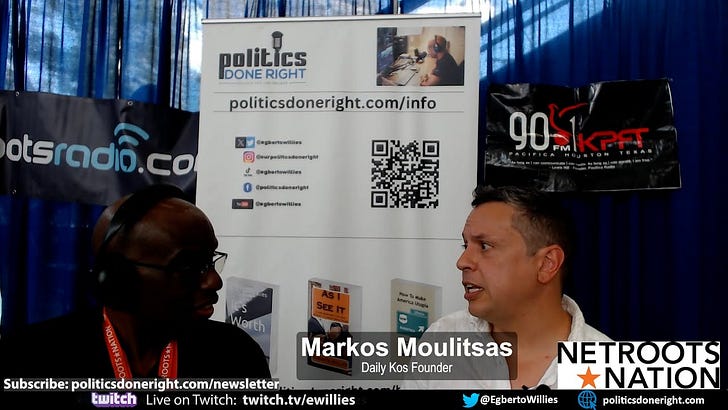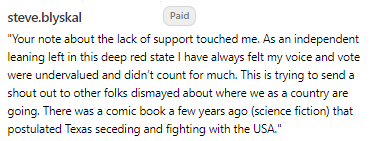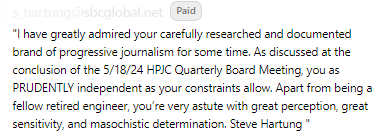Markos Moulitsas, Daily Kos founder, discusses the state of American politics
Join Markos Moulitsas, founder of Daily Kos, at Netroots 2024 as he discusses the chaotic state of American politics, the electorate’s exhaustion, and strategies for progressive success.
A quick but important note before reading this prescient article
Our Paid Subscriber to Free Subscriber ratio is too low for long-term sustainability. WE NEED HUNDREDS MORE, especially in this political climate. Misinformation funded by the deep pockets of our Oligarchy floods the internet. We are using all our platforms on-air, online, and in publications to counter that. We ask that you invest the equivalent of less than a coffee to ensure we can keep doing this. Please invest in a Democracy that serves all of us by becoming a paid subscriber. It comes with many benefits.
Markos Moulitsas, Daily Kos founder, speaks.
The recent conversation Markos Moulitsas, founder of Daily Kos, had at the Netroots 2024 convention with “Politics Done Right” offers a profound examination of the current political landscape in the United States. Moulitsas, an influential figure in progressive politics, accurately critiques the achievements and pitfalls of today’s political climate. His insights into the polarization, the role of media, and the strategic direction of the progressive movement shed light on the complexities that activists and citizens face in navigating this tumultuous era.
Moulitsas begins by reflecting on the origins of Daily Kos, which emerged as a counterbalance to the dominant conservative voices in the media. At its inception, Daily Kos sought to amplify liberal perspectives, providing a much-needed platform for progressive discourse. The success of this venture is evident in the subsequent rise of progressive media and activism, which have played critical roles in shaping public opinion and policy discussions. However, Moulitsas points out that this initial success has also led to an unintended consequence: a deeply entrenched partisanship that often prioritizes political point-scoring over substantive governance.
One of the central themes of the conversation is the notion of a “broken” political system. Moulitsas asserts that the hyper-partisan environment has led to a legislative gridlock, where even essential tasks like passing continuing resolutions to keep the government funded become contentious battles. This dysfunction is not just a theoretical problem; it has real-world implications, such as risking the country’s credit rating and creating uncertainty in governance. The exhaustion and disillusionment among voters are palpable, with many feeling that they are merely “crawling to the finish line” of each election cycle, longing for a respite from the constant political warfare.
The discussion also touches on the challenges within the progressive movement itself. Moulitsas acknowledges the internal conflicts and the need for a more strategic approach to advocacy and activism. He contrasts successful movements, like the Civil Rights Movement and the marriage equality movement, which were tactical and methodical, with less effective efforts that lack a clear strategy and often alienate potential allies. This critique is particularly relevant in contemporary issues like the Gaza conflict, where he argues that some advocacy efforts have been counterproductive.
The interview also delves into the broader implications of these dynamics, highlighting the importance of strategic thinking in advocacy. They emphasize the need for movements to build public support before pushing for political change. This principle is encapsulated in Moulitsas’s assertion: “If you have public support, do politics. If you don’t have public support, do advocacy.” This approach underscores the necessity of groundwork in building a sustainable and effective movement.
The conversation also explores the personal toll of sustained political engagement. Moulitsas noted a sense of burnout, not just among activists but within the general populace. The relentless cycle of political crises, exacerbated by figures like Donald Trump, has left many weary and discouraged. This fatigue is compounded by the erosion of institutional trust, particularly in the Supreme Court, which Moulitsas describes as acting more like “kings” than impartial arbiters of justice.
Despite these challenges, the interview presented optimism about the potential for progressive victories, particularly in the upcoming elections. Progressives have higher stakes as their rights and broader social justice issues are on the line. In contrast, conservatives are less at risk if they lose, making the motivation to fight even more critical for the left. This perspective aligns with broader electoral trends, where progressive turnout has been decisive in recent elections across various countries.
The discussion concludes with a call for a change in tone and strategy within the progressive movement. Moulitsas advocates for a more thoughtful and less reactionary approach to politics, urging progressives to focus on substantive issues rather than getting caught up in the daily spectacle of partisan bickering. This shift, he argues, is essential for building a more resilient and influential movement that can achieve lasting change.
The conversation with Markos Moulitsas at Netroots 2024 offers a candid and insightful analysis of the state of American politics. It highlights the progressive movement's successes and failures, the challenges of navigating a hyperpartisan landscape, and the necessity of strategic advocacy. Moulitsas’s reflections serve as both a critique and a roadmap for those committed to advancing progressive values in an increasingly complex and divided political environment.
Can we count on your help to reach our goal of 100 new paid subscriptions by the end of the month?
The other side has big donors and everyday citizens who invest heavily in platforms that lie and misinform. All we have is you. So, please invest in our media outlet by clicking the subscribe button below to become a paid subscriber. You won’t miss that coffee, but it will make a difference in our politics as we spread the truth about our policies and progressive politics. All paid subscribers get to read my five books on this platform and all subsequent books I write. They will also be privy to subsequent incentives.







